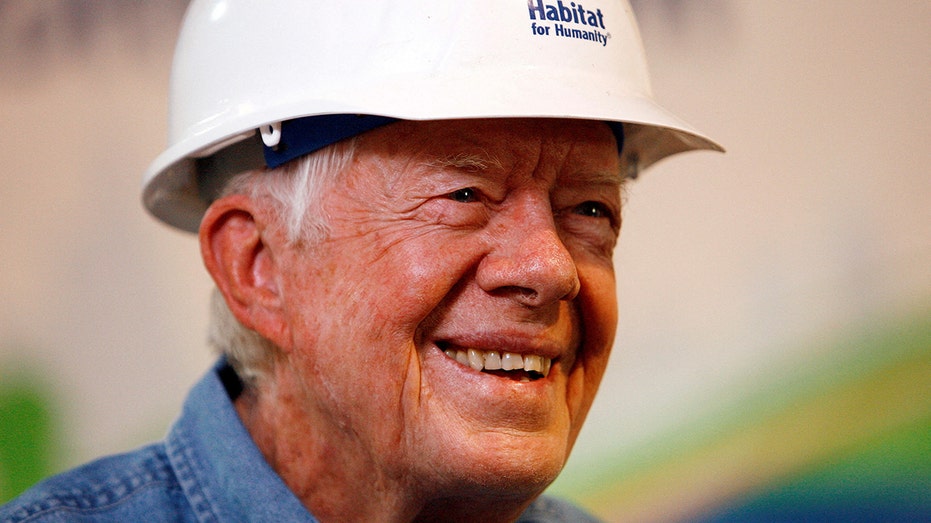What Jimmy Carter can teach us about life and our legacy
Not only is America saying goodbye to a president, but behind the protocol and pageantry, the Carters are saying goodbye to a father, a grandfather, an uncle, and a friend.

National mourning is a time for remembrance and reflection and gives us the freedom to do so through a lens of patriotism, not politics – and from a posture of gratitude, not partisanship. This is where we are today as the nation learns of the passing of our 39th President, Jimmy Carter.
Though many on the right have criticized Jimmy Carter’s policies, we can still recognize and celebrate his willingness to step up and engage in public service to our nation through his military career as a naval officer and his political career as governor and state senator from Georgia, as well as president of the United States. We should also acknowledge the humanity behind this loss. Not only is America saying goodbye to a president, but behind the protocol and pageantry, the Carters are saying goodbye to a father, a grandfather, an uncle, and a friend to many who knew him personally.
This must be an especially difficult time for the Carter family as they said goodbye to Rosalynn in November of last year. The former first lady had been diagnosed with dementia and entered hospice care just two days prior to her passing. Surprisingly, President Carter entered hospice care in February 2023, but outlived his wife by more than a year. The Carters were married for 77 years – the longest presidential marriage in American history. They will be buried side by side on their property in Plains, Georgia, where they lived for more than 60 years.
JIMMY CARTER, 39TH PRESIDENT OF THE UNITED STATES, DEAD AT 100
Though he was best known as president, Carter was most comfortable at home in Plains, rather than on the world stage. He lived a life which was simple, modest, and humble. He was deeply committed to faith, to family, and to living a life in service to others. He was actively involved in his church, teaching Sunday School, and immersing himself in both the Word of God, as well as the work of God here on earth.
Some may be conflicted about how they think of Jimmy Carter upon his passing, and that is OK. Life is complicated and people are complex. No one’s life can be placed entirely on one side of a Good or Bad ledger. Thankfully so -- for all of us. We can celebrate a selfless life devoted to others, and let history be the judge of Jimmy Carter’s final legacy.
He remained invested in global issues surrounding world peace and election integrity, often traveling to foreign countries to represent this passion. Yet Carter was most at ease in blue jeans, swinging a hammer alongside volunteers with Habitat for Humanity, building homes for those in need.
DOUG SCHOEN: JIMMY CARTER PROVIDED A MODEL FOR THE POST-PRESIDENCY
While he could have retired long ago and rested on his laurels of accomplishment, Carter chose to continue to use his platform and notoriety to bless others, doing so with his words, as well as his actions. In many ways he embodied the American spirit of generosity, selflessness, voluntarism, and reflected the true heart of America, which is abundantly found in small towns like Plains which dot this great nation.
In October 1986, when Carter’s presidential successor, Ronald Reagan, spoke at the dedication ceremony for the Carter Presidential Center in Atlanta, Reagan said," None of us today need feel any urge, in the name of good will, to downplay our differences. On the contrary, in a certain sense, we can be proud of our differences, because they arise from good will itself -- from love of country; for concern for the challenges of our time; from respect for, and yes, even outright enjoyment of, the democratic processes of disagreement and debate. Today our very differences attest to the greatness of our nation. For I can think of no other country on Earth where two political leaders could disagree so widely yet come together in mutual respect."
Amidst their differences, Reagan preferred to focus on areas of commonality with Jimmy Carter, and we would be wise to do the same. Indeed, there were many things on which we did agree – a love of country, love of God, love of service, love of the land, the value of life, the importance of peace and democratic elections, and the desire to eradicate disease worldwide.
CLICK HERE FOR MORE FOX NEWS OPINION
The story of Jimmy Carter’s presidency has already been recorded for posterity – both the highs and the lows. Historians will ultimately determine his place and impact in the annals of history. Some of it will not be flattering. While he was alive, Carter himself knew what was being said about the malaise and decline of America under his leadership. He knew what would be said after he was gone too. Perhaps that’s why he worked so hard to create another aspect of his legacy after leaving the White House. It may actually be his later years which were most meaningful and will be most remembered.
Everyone has chapters of their life they are proud of – and some they are not. It is up to each of us to be active participants in the writing of our own legacies. Our legacies are not written after we are gone but are written with every day of our lives.
Much of life is handed to us and we are forced to react or respond to it. But for the elements of life we can control, initiate, and prioritize, maybe Jimmy Carter was a great example of a life well lived – in totality – not judged exclusively by its lowest moments, but rather by how it ended.
Ultimately, Jimmy Carter left this earth the way he wanted to - simply, humbly, quietly, surrounded by family and friends, secure in God’s love and salvation, having lived a long, full life in service to others. Perhaps, at its core, that’s what it truly means to have lived a great American life.



